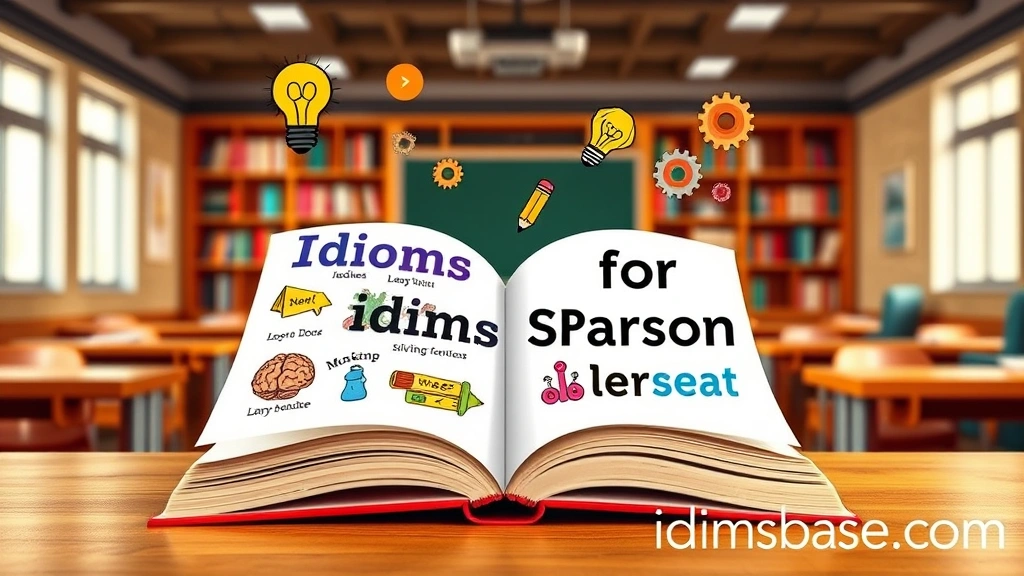You know that feeling when someone says something brilliant, and you think, "Wow, they really know their stuff!"? Or when a conversation takes an unexpected turn, and someone drops a perfectly fitting idiom that just makes everything click? It's like a secret handshake among those who truly understand the nuances of language.
Idioms are the spice of language, the witty shortcuts that add color, depth, and a touch of cleverness to our conversations. They're not always literal, which is precisely where their charm (and sometimes their challenge!) lies. But for someone who's truly sharp, someone who's quick-witted and insightful, idioms become powerful tools. They allow you to express complex ideas concisely, to show your understanding of subtle social cues, and to simply sound, well, smarter!
In a world that’s constantly buzzing with information, being able to articulate your thoughts elegantly and efficiently is a superpower. And mastering idioms for a smart person is like adding extra gears to your linguistic engine. So, if you're ready to elevate your communication game and sprinkle some linguistic brilliance into your daily interactions, you've come to the right place. Let's dive into 35 fantastic idioms that truly capture the essence of a clever mind!
35 Idioms for a Smart Person
Here's a collection of idioms that perfectly describe someone intelligent, insightful, or simply brilliant. You might even find yourself using a few of these today!
-
A quick study: This idiom describes someone who learns new things very quickly and easily.
- Example: "She's a quick study; she mastered the new software in just a few hours."
-
Sharp as a tack: Meaning very intelligent and mentally acute.
- Example: "My grandmother is 90, but she's still as sharp as a tack."
-
To have a good head on one's shoulders: To be sensible, practical, and intelligent.
- Example: "He always makes wise decisions; he truly has a good head on his shoulders."
-
To be on the ball: To be alert, attentive, and quick to understand or react.
- Example: "Our new project manager is really on the ball; nothing gets past her."
-
To have one's wits about one: To be alert and able to think clearly, especially in a difficult situation.
- Example: "When the fire alarm went off, she had her wits about her and quickly guided everyone out."
-
To pick someone's brain: To ask someone who is knowledgeable for information or advice.
- Example: "Could I pick your brain about that new marketing strategy?"
-
To be a whiz kid: A young person who is exceptionally intelligent or skilled in a particular area.
- Example: "The new programmer is a real whiz kid; he debugged the entire system in a day."
-
To be a bright spark: A clever, intelligent, or innovative person.
- Example: "We need a bright spark like you to solve this complex problem."
-
To have a brain like a sponge: To be very good at absorbing and retaining information.
- Example: "My son has a brain like a sponge; he remembers everything he reads."

-
To be a walking encyclopedia: Someone who has a vast amount of knowledge on many subjects.
- Example: "Ask Sarah; she's a walking encyclopedia when it comes to history."
-
To connect the dots: To understand how different pieces of information or events are related.
- Example: "Once he connected the dots, the entire mystery made sense."
-
To think outside the box: To think creatively and unconventionally.
- Example: "We need to think outside the box to come up with a truly innovative solution."
-
To see the big picture: To understand the overall situation or context, rather than just the details.
- Example: "It's important to see the big picture before making a hasty decision."
-
To get the hang of something: To learn how to do something, especially something complicated.
- Example: "It took me a while, but I'm finally getting the hang of this new software."
-
To be ahead of the curve: To be more advanced or innovative than others in a particular field.
- Example: "Their research team is always ahead of the curve in genetic engineering."
-
To have an old head on young shoulders: A young person who is wise and mature beyond their years.
- Example: "Despite being only 22, he has an old head on young shoulders when it comes to business."
-
To be a cut above: To be superior to others in quality or ability.
- Example: "Her presentation was a cut above the rest; it was truly exceptional."
-
To be no slouch: To be competent and not lazy; often implying intelligence or skill.
- Example: "He's no slouch when it comes to coding; he can solve any problem."
-
To have a flash of genius: A sudden, brilliant idea or insight.
- Example: "In the middle of the night, I had a flash of genius about how to fix the bug."
-
To be a master of all trades (or jack of all trades, master of none): While "jack of all trades" often implies superficial knowledge, "master of all trades" is used for someone exceptionally versatile and skilled in many areas.
- Example: "She's not just good at writing; she's a master of all trades, excelling in art and science too."
-
To be a deep thinker: Someone who considers things carefully and thoroughly.
- Example: "My philosophy professor is a deep thinker; his lectures always make you ponder."

-
To have a knack for something: To have a natural talent or ability for something.
- Example: "She has a real knack for solving puzzles."
-
To be on top of one's game: To be performing at one's best, often due to high intelligence or skill.
- Example: "The athlete was on top of his game, breaking all previous records."
-
To have insight into something: To have a clear, deep, and often sudden understanding of a complex situation or problem.
- Example: "Her analysis showed remarkable insight into the market trends."
-
To read between the lines: To understand the unstated or implied meaning.
- Example: "You have to read between the lines to truly understand what the politician is saying."
-
To have a light bulb moment: A sudden moment of inspiration or realization.
- Example: "After struggling for hours, I finally had a light bulb moment and solved the equation."
-
To be a knowledge repository: Similar to a walking encyclopedia, a person who holds a vast amount of information.
- Example: "Our lead researcher is a knowledge repository; he knows everything about this field."
-
To be mentally agile: To be able to think quickly and adapt effectively to new situations.
- Example: "The debate team needs someone mentally agile to respond to unexpected arguments."
-
To have a strong grasp of something: To have a thorough understanding of a subject or concept.
- Example: "He has a strong grasp of quantum physics, which is rare."
-
To be a shrewd operator: Someone who is clever and practical, especially in business or negotiations.
- Example: "She's a shrewd operator; she always manages to get the best deal."
-
To be quick on the uptake: To be quick to understand something new or difficult.
- Example: "Don't worry about explaining it twice; he's very quick on the uptake."
-
To have all one's ducks in a row: To be well-prepared and organized, often indicative of a systematic and intelligent approach.
- Example: "Before launching the new product, we need to make sure all our ducks are in a row."
-
To be a fountain of knowledge: A person who is an abundant source of information and wisdom.
- Example: "My professor is a fountain of knowledge; I learn something new every time I talk to him."

-
To have cognitive prowess: A more formal way of saying someone has exceptional mental ability.
- Example: "Her cognitive prowess was evident in her ability to solve complex mathematical problems effortlessly."
-
To be a visionary: Someone who has original ideas about what the future will or could be like.
- Example: "Steve Jobs was a visionary; he completely changed the tech industry."
Key Takeaways
Idioms are more than just quirky phrases; they're cultural insights, linguistic shortcuts, and powerful ways to convey complex ideas with brevity and flair. For a smart person, mastering these idioms isn't just about sounding sophisticated; it's about:
- Enhanced Communication: Expressing ideas more vividly and concisely.
- Cultural Fluency: Demonstrating a deeper understanding of the language and its nuances.
- Cognitive Agility: Showing quick thinking and the ability to "read between the lines."
- Building Rapport: Connecting with others who appreciate linguistic artistry.
So, go forth and sprinkle these clever idioms into your conversations! You'll not only enrich your own speech but also impress those around you with your linguistic prowess.
Frequently Asked Questions (FAQ)
Q1: Why are idioms important for a smart person to know?
A1: Idioms are crucial because they add depth, nuance, and color to communication. For a smart person, knowing idioms demonstrates not just vocabulary, but also cultural understanding, quick wit, and the ability to express complex ideas concisely. They allow you to communicate effectively and often humorously, showing that you can "read between the lines" and understand implied meanings, which is a hallmark of intelligence.
Q2: How can I learn and remember new idioms effectively?
A2: Learning idioms is fun! Here are some tips:
- Context is Key: Don't just memorize definitions. Pay attention to how idioms are used in sentences, movies, or books.
- Visualize: Many idioms create a vivid mental image (e.g., "sharp as a tack"). Visualizing them can help with recall.
- Practice, Practice, Practice: Try to incorporate new idioms into your conversations or writing. The more you use them, the more natural they'll become.
- Flashcards: Create flashcards with the idiom on one side and its meaning and an example sentence on the other.
- Group by Theme: Group idioms by similar meanings or contexts (e.g., idioms for intelligence, idioms for difficulty).
Q3: Are idioms used the same way in all English-speaking countries?
A3: While many idioms are universally understood across English-speaking countries (like "think outside the box"), some are more common in specific regions (e.g., American English vs. British English). There can also be slight variations in meaning or usage. It's always good to be aware of your audience when using less common idioms. Generally, the idioms listed here are widely recognized.
Q4: Can using too many idioms make my communication unclear?
A4: Yes, absolutely! While idioms add flavor, overusing them can make your speech sound forced, unnatural, or even confusing, especially if your audience isn't familiar with them. The goal is to use them appropriately and naturally, like adding a pinch of spice to a dish – just the right amount to enhance the flavor, not overpower it. Balance is key.
Q5: How do idioms relate to cultural understanding?
A5: Idioms are deeply embedded in a culture's history, traditions, and way of thinking. Understanding an idiom often means understanding a piece of cultural context. For example, "to bite the bullet" has origins in military history. Knowing idioms shows that you're not just learning a language, but also gaining insight into the culture of its speakers. It demonstrates a sophisticated level of fluency and cultural awareness.






